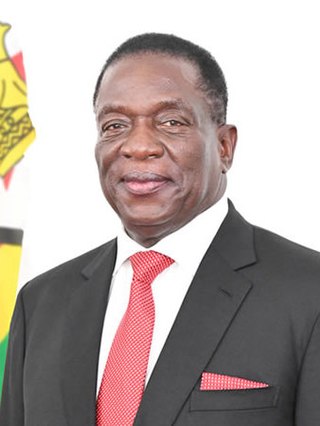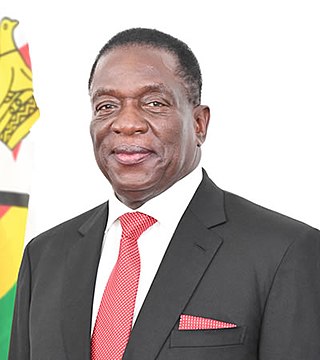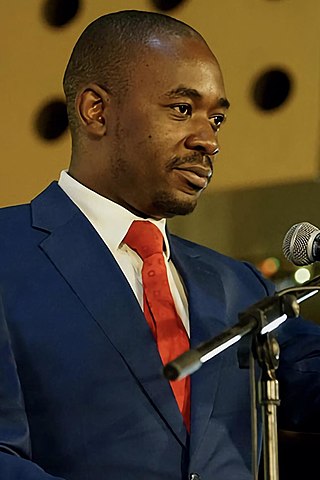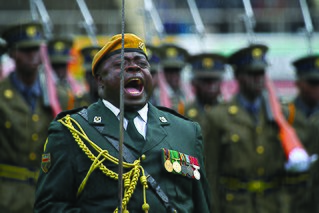Related Research Articles

Zimbabwe, officially the Republic of Zimbabwe, is a landlocked country in Southern Africa, between the Zambezi and Limpopo Rivers, bordered by South Africa to the south, Botswana to the southwest, Zambia to the north, and Mozambique to the east. The capital and largest city is Harare, and the second largest is Bulawayo.

The politics of Zimbabwe occurs in a society deeply divided along lines of race, ethnicity, gender and geography. The ZANU–PF party has historically been dominant in Zimbabwe politics. The party, which was led by Robert Mugabe from 1980 to 2017, has used the powers of the state to intimidate, imprison and otherwise hobble political opposition in Zimbabwe, as well as use state funds and state media to advance the interests of the party.

The Zimbabwe African National Union – Patriotic Front (ZANU–PF) is a political organisation which has been the ruling party of Zimbabwe since independence in 1980. The party was led for many years under Robert Mugabe, first as prime minister with the Zimbabwe African National Union (ZANU) and then as president from 1987 after the merger with the Zimbabwe African People's Union (ZAPU) and retaining the name ZANU–PF, until 2017, when he was removed as leader.

Matabeleland South is a province in southwestern Zimbabwe. With a population of 683,893 as of the 2012 Zimbabwean census, it is the country's least populous province. After Matabeleland North, it is Zimbabwe's second-least densely populated province. Matabeleland South was established in 1974, when the original Matabeleland Province was divided into two provinces, the other being Matabeleland North. The province is divided into six districts. Gwanda is the capital, and Beitbridge is the province's largest town. The name "Matabeleland" is derived from Ndebele, the province's largest ethnic group.

The United African National Council (UANC) is a political party in Zimbabwe. It was briefly the ruling party during 1979–1980, when its leader Abel Muzorewa was Prime Minister.

The Zimbabwe government consists of an elected head of state, the president, and a legislature. The presidential term lasts for 5 years, and is elected by majority, with a second round if no candidate receives a majority in the first round. The Parliament is bicameral, consisting of the House of Assembly and Senate. Following the 2013 constitution, the House of Assembly has 270 members. 210 are elected for five-year terms by single-member constituencies. Furthermore, the constitution specifies that for the two first parliaments, there are 60 additional seats reserved for women, 6 seats per province, which are filled based on the votes for in the single-member constituencies, using party-list proportional representation, distributed using the largest remainder method and the hare quota. The Senate has 80 members: 60 are elected for five-year terms in 6-member constituencies representing one of the 10 provinces, elected based on the votes in the lower house election, using party-list proportional representation, distributed using the hare quota. Additionally the senate consists of 2 seats for each non-metropolitan district of Zimbabwe elected by each provincial assembly of chiefs using SNTV, 1 seat each for the president and deputy president of the National Council of Chiefs and 1 male and 1 female seat for people with disabilities elected on separate ballots using FPTP by an electoral college designated by the National Disability Board.

Emmerson Dambudzo Mnangagwa is a Zimbabwean politician who has served as President of Zimbabwe since 24 November 2017. A member of ZANU–PF and a longtime ally of former President Robert Mugabe, he held a series of cabinet portfolios and was Mugabe's Vice-President until November 2017, when he was dismissed before coming to power in a coup d'état. He secured his first full term as president in the disputed 2018 general election. Mnangagwa has been re-elected in 2023 with 52.6% of the votes. Nelson Chamisa came in second with 44%.
Lottie Gertrude Stevenson was a Zimbabwean ambassador and politician. She was a member of parliament for Harare North in the Parliament of Zimbabwe. She was also a founding member of the Movement for Democratic Change (MDC) of Zimbabwe, the first white woman to be voted into the MDC National Executive and, during her tenure, the country's only white female Member of Parliament.

Didymus Noel Edwin Mutasa is a Zimbabwean politician who served as Zimbabwe's Speaker of Parliament from 1980 to 1990. Subsequently, he held various ministerial posts working under President Robert Mugabe in the President's Office. He was Minister of State for Presidential Affairs from 2009 to 2014 and also served as ZANU-PF's Secretary for Administration.

The Cabinet of Zimbabwe is the executive body that forms the government of Zimbabwe together with the President of Zimbabwe. The Cabinet is composed of the President, the Vice-Presidents, and ministers appointed by the President. Until 1987, the Cabinet was chaired by the Prime Minister; it is now headed by the President.

Harare Metropolitan Province is a province in northeastern Zimbabwe that comprises Harare, the country's capital and largest city, and three other municipalities, Chitungwiza, Epworth and Ruwa. At independence in 1980, it was originally part of Mashonaland Province which in 1983 was divided into three large provinces, Mashonaland Central, Mashonaland East, and Mashonaland West - at this point, the city of Harare became part of Mashonaland East. In 1997, along with Bulawayo, it became a metropolitan province, along with the then two nearby urban settlements. Harare Metropolitan Province is divided into four local government areas - a city council, a municipality and two local boards.
The Zimbabwe Unity Movement, was a short lived political movement in Zimbabwe. It served as a successor and link to the Conservative Alliance of Zimbabwe. Edgar Tekere ran as Presidential Candidate in the 1990 Zimbabwean Presidential election, against Robert Mugabe.

General elections were held in Zimbabwe on 31 July 2013. Incumbent President Robert Mugabe was re-elected, whilst his ZANU–PF party won a two-thirds majority in the National Assembly.

The president of Zimbabwe is the head of state of Zimbabwe and head of the executive branch of the government of Zimbabwe. The president chairs the national cabinet and is the chief commanding authority of the Zimbabwe Defence Forces.

General elections were held in Zimbabwe on 30 July 2018 to elect the President and members of both houses of Parliament. Held eight months after the 2017 coup d'état, the election was the first since independence in which former President Robert Mugabe was not a candidate.

The 9th Parliament of Zimbabwe was the meeting of the Zimbabwean Parliament, composed of the Senate and the National Assembly. It began meeting in Harare on 18 September 2018. Its membership was set by the 2018 Zimbabwean general election, which gave the ruling ZANU–PF party a two-thirds majority in Parliament and control of both chambers. The Movement for Democratic Change Alliance is the minority coalition.

Emmerson Mnangagwa is the third and current President of Zimbabwe since 24 November 2017. Previously, he served as Vice-President of Zimbabwe from 2014 to 2017, and in various cabinet portfolios before that. Mnangagwa was a member of the Parliament of Zimbabwe from 1985 to 2015.

The Presidential Guard (PG) of the Zimbabwe National Army is an elite unit responsible for protecting the President of Zimbabwe. It is one of eight brigade-sized formations and two district commands in the ZNA. The members of the unit, some of which are from neighboring states such as Angola, provide presidential protection and also perform ceremonial duties in the national capital.

General elections were held throughout Zimbabwe on 23 and 24 August 2023 to elect the president, legislators and councillors. The main race for presidential office was between two candidates of Karanga origin: ZANU–PF's Emmerson Dambudzo Mnangagwa and Citizens Coalition for Change's Nelson Chamisa. The voter rolls for the election increased to 6.5 million, up from 5.8 million in 2018.
The District of Columbia is a political division coterminous with Washington, D.C., the capital city of the United States. According to the Article One of the Constitution, only states may be represented in the United States Congress. The District of Columbia is not a U.S. state and therefore has no voting representation.
References
- ↑ Sachikonye, Lloyd (Autumn 1990). "The 1990 Zimbabwe Elections: A Post-Mortem". Review of African Political Economy. 48 (48): 97. JSTOR 4005942.
- ↑ "Presidential Election 2002 Results" (PDF). Election Resource Centre. 20 August 2014.
- ↑ "Nelson Chamisa claims ZEC's results are 'unverified and fake'". The Citizen. 3 August 2018. Retrieved 9 December 2018.
- ↑ "Zimbabwe Electoral Commission". 2023. Retrieved 26 August 2023.